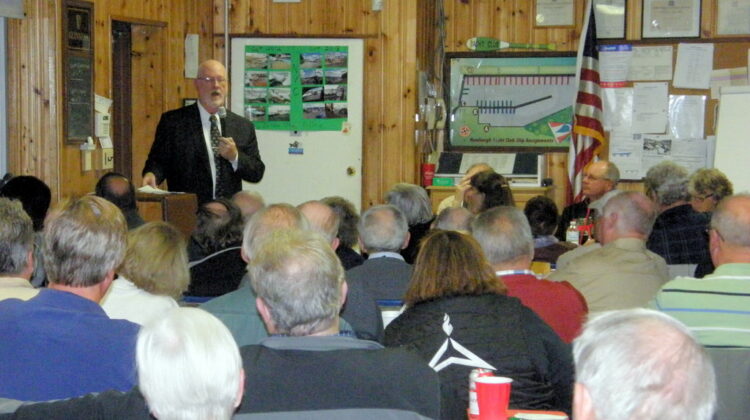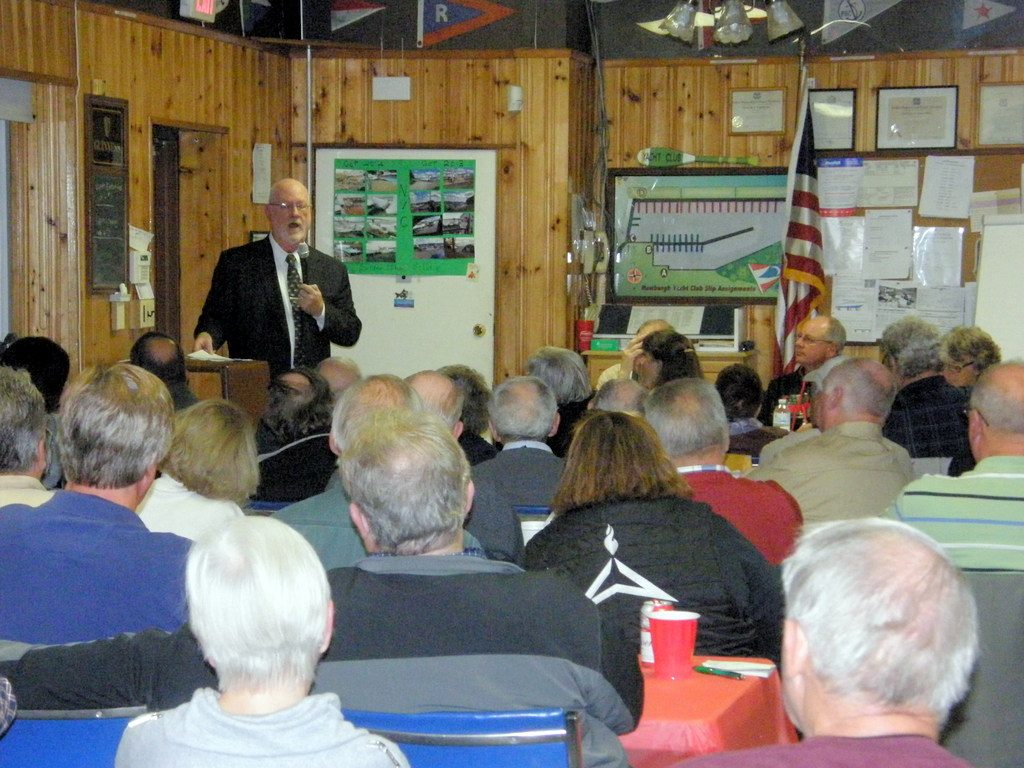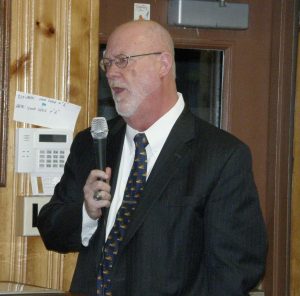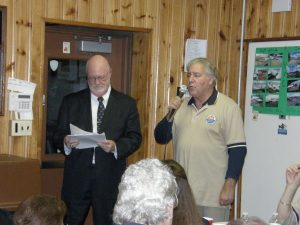

Edward Kelly, Executive Director of the Maritime Association of the Port of New York/New Jersey was the guest speaker at the Hudson River Boat and Yacht Club Association Meeting held at the Newburgh Yacht Club.
Kelly who represents a trade association for the maritime industry said he was here to sort out the myths and facts about the Federally Protected Anchorages proposed for the Hudson River. He said all that you hear or read about the subject may not be true.
Cathy Nugent, the liaison from the Newburgh Yacht Club to the Hudson River Boat and Yacht Club Association said interest in the topic was high. She said the meeting had an attendance of 67 the highest ever for an association meeting. The meeting was held on November 29, 2016.
Some of the facts Kelly stated were that the maritime industry provides the cleanest most environmentally friendly form of transportation. That it saves 3.1 million truck trips a year in the New York area; that 1-barge equals the load carried by 60 truck trailers.

He said the Federally Protected Anchorages will promote safety. He said they’ll be be good for use in fog, and bad weather, equipment problems and ice. He said the anchorage sites were selected by depth, shelter from the current and the width of the river.
The proposed anchorages are for ten locations between Kingston and Yonkers and would provide 43 berths for commercial vessels.
Anchorages will not be used as a parking lot for petroleum products, he said. Usual use time by a barge or ship in an anchorage is 4 to 6 hours, he said.
All barges carrying petroleum products are now required to be double hulled, he said. No oil spills have occurred since records started to be kept in 2011, he said.
Vital cargos for our community come to us via barges and ships on the Hudson River, he said. They include home heating oil, refined gasoline for use in our cars, cement, crushed rock. Water transportation is the safest, cleanest mode of transportation for doing this he said.
Before beginning a question and answer portion of the program he said he wanted to dispel thoughts that the anchorages are going to be used to store crude oil for export. He said it doesn’t make economic sense. Every fuel barge on the river has to have a manned crew and tug boat assigned. That’s $5,000 in costs each day. The fuel owners with these costs have to keep it moving, he said.

Questions from the audience included; Will chemicals on the river bottom be stirred up when ships anchor? After 400 years of the river being used, why now? Why not just put the data for the anchorage sites out for GPS use? Will railroad transportation of oil decrease and barge transportation increase?
Time for written comments on the Anchorages to be submitted to the Coast Guard ends on December 6, 2016. The Coast Guard may decide to hold public hearings to gather more input. Kelly says he doesn’t expect a decision for about a year.
Kelly thanked the Association for having him at its meeting by stating the anchorages will enhance the beneficial moving of traffic on the river, increasing safety and efficiency.
Kelly received applause for attending.
The HRBYCA has previously voted to oppose the anchorage proposal. It has also sent signed petitions and letters to the Coast Guard and legislators. The Newburgh Yacht Club has also voted to join the association in its opposition to the anchorages.
Newburgh Yacht Club Commodore Greg Dombroski welcomed the HRBYCA members by giving them a short history of our club that goes back 131 years to 1885.
Newburgh Yacht Club members lead by Edward “Moon” Mullins prepared and served dinner to the those attending.
Here’s a gallery of pictures from the meeting.
[cincopa A4DA4zd8z_qE]
Mr. Edward Kelly had a rough time with the crowd at this event. Obviously there are still many questions unanswered and they will hopefully come to light through the U.S. Coast Guard review process. It was good that so many people came out to voice their opinions and raise questions.
On a lighter note, perhaps we should build or purchase a real lecture so our guests don’t have to use the top of a trash can to speak from. I’m sure it was kind of fitting for this topic from the view point of most in the audience but I wonder what the speaker was feeling?
Thank you for the kind reception, and opportunity to address the HRCYCA regarding the USCG Advanced Notice of Rule Making pertaining to the proposal to establish 10 federally designated anchorage areas in the Hudson River. My wife and I enjoyed your hospitality, and I welcomed the opportunity to present some of the facts underlying our proposal.
As stated at the meeting, I would be pleased to forward copies of my comments, and the referenced U of Delaware report to anyone who requested it, and I have already sent copies to several members who requested it at the meeting.
There is definitely room on the water for everyone, and it is the obligation of everyone who is on the water to operate as safely as is possible.
I again thank everyone involved for being polite, receptive, and willing to discuss the issue!